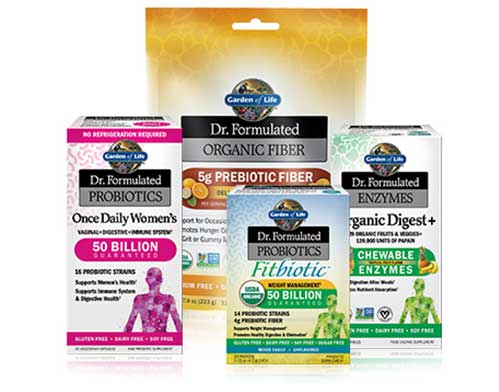Probiotics, Prebiotics & Healthy Pregnancy
- 9/19/16

by David Perlmutter, M.D., Board-Certified Neurologist, #1 New York Times Best-Selling Author, Fellow of the American College of Nutrition
It has been only recently that we have embraced a dramatic shift in our perception of bacteria and the role that they play in terms of human health. Far from being the agents of infectious diseases, by and large, we now recognize that most of the bacteria that live within us are actually supporting our health.
There’s an astounding amount of research being published these days revealing the important role of probiotic gut bacteria in terms of regulating our blood sugar, controlling inflammation, stabilizing our immune systems and even producing various brain chemicals that affect our mood from moment to moment.
And perhaps nowhere is the research more exciting than in the areas of prenatal and postnatal health. How exciting and indeed empowering it is to embrace the notion that the health and diversity of the organisms living within the mother’s intestines (her microbiome) have a profound role to play in terms of the health outcome of her baby.
There are several important mechanisms that relate fetal development to the health and diversity of the mother’s gut bacteria:
It is for these reasons that there has been such an explosion in research looking at the health benefits of prenatal prebiotic supplementation for both Mother and Baby. And this research is turning up some important evidence showing that mothers taking specific probiotics during pregnancy have babies that have a sizable reduction in their risk for some common childhood issues, such as allergies and eczema. As Australian researchers recently reported in the journal Diabetes and Pregnancy, “Probiotic supplementation could help to regulate the unbalanced microflora composition observed in obesity and diabetes. . . There are indications for a protective role in preeclampsia, gestational diabetes mellitus, vaginal infections, maternal and infant weight gain and allergic diseases.”
Probiotics are a safe and effective way of enhancing the diversity and health of the microbiome in pregnant women. Probiotics given prenatally are an important way for mothers to safeguard their health during their pregnancy as well as the health of their babies.
Oral probiotics are safe during pregnancy and should be continued through lactation as well. Research into the effects of oral probiotics in terms of health benefits conferred to the baby through breast milk are in their early stages, but the results that have been revealed in animals are very compelling. Healthier moms make healthier breast milk, and probiotics are certainly one important way for lactating women to remain healthy.
Finally, it’s always important to recognize that, while probiotics are an effective way to enhance the health of the gut bacteria, prebiotic fiber also nurtures the good probiotic organisms that are already present. So, in addition to a good probiotic supplement, women should consider adding a good prebiotic supplement to their daily regimens during pregnancy as well as during lactation.
This information is intended for educational and informational purposes only. It should not be used in place of an individual consultation or examination or replace the advice of your health care professional and should not be relied upon to determine diagnosis or course of treatment.
It has been only recently that we have embraced a dramatic shift in our perception of bacteria and the role that they play in terms of human health. Far from being the agents of infectious diseases, by and large, we now recognize that most of the bacteria that live within us are actually supporting our health.
There’s an astounding amount of research being published these days revealing the important role of probiotic gut bacteria in terms of regulating our blood sugar, controlling inflammation, stabilizing our immune systems and even producing various brain chemicals that affect our mood from moment to moment.
And perhaps nowhere is the research more exciting than in the areas of prenatal and postnatal health. How exciting and indeed empowering it is to embrace the notion that the health and diversity of the organisms living within the mother’s intestines (her microbiome) have a profound role to play in terms of the health outcome of her baby.
There are several important mechanisms that relate fetal development to the health and diversity of the mother’s gut bacteria:
- A healthier mother makes for a healthier baby. In all of us, having healthy gut bacteria helps control body weight as well as blood sugar. Excessive weight gain as well as elevated blood sugar not only represent direct health threats to women when they’re pregnant, but also lead to significant increased risk for health issues in newborn babies.
- Mother’s gut bacteria manufacture some important chemicals that affect fetal development. Look at any prenatal vitamin, and no doubt you will see that it contains a healthy dose of folate. The reason folate is included in prenatal vitamins is because it’s clearly been shown that when folate is deficient, there is an increased risk for neurological problems in terms of fetal development. As it turns out, folate is aggressively produced by our gut bacteria, especially the Bifidobacteria.
- At the time of birth, the emerging newborn passes through the birth canal. And this event is a critically important process in establishing a newborn’s microbiome in terms of his or her gut bacteria. When the baby is born, his or her initial microbiome very much reflects the array of bacteria acquired during the actual birth process. New research reveals that the mother’s gut bacteria significantly influences the diversity of the bacteria in the birth canal, and as such, influences the newborn’s microbiome as well. Mother’s gut bacteria are actually transported throughout her body. They can be found in the placenta, the umbilical cord and even in the birth canal where they, in turn, seed the newborn, basically anointing the baby with the seeds for his or her developing microbiome.
It is for these reasons that there has been such an explosion in research looking at the health benefits of prenatal prebiotic supplementation for both Mother and Baby. And this research is turning up some important evidence showing that mothers taking specific probiotics during pregnancy have babies that have a sizable reduction in their risk for some common childhood issues, such as allergies and eczema. As Australian researchers recently reported in the journal Diabetes and Pregnancy, “Probiotic supplementation could help to regulate the unbalanced microflora composition observed in obesity and diabetes. . . There are indications for a protective role in preeclampsia, gestational diabetes mellitus, vaginal infections, maternal and infant weight gain and allergic diseases.”
Probiotics are a safe and effective way of enhancing the diversity and health of the microbiome in pregnant women. Probiotics given prenatally are an important way for mothers to safeguard their health during their pregnancy as well as the health of their babies.
Oral probiotics are safe during pregnancy and should be continued through lactation as well. Research into the effects of oral probiotics in terms of health benefits conferred to the baby through breast milk are in their early stages, but the results that have been revealed in animals are very compelling. Healthier moms make healthier breast milk, and probiotics are certainly one important way for lactating women to remain healthy.
Finally, it’s always important to recognize that, while probiotics are an effective way to enhance the health of the gut bacteria, prebiotic fiber also nurtures the good probiotic organisms that are already present. So, in addition to a good probiotic supplement, women should consider adding a good prebiotic supplement to their daily regimens during pregnancy as well as during lactation.
This information is intended for educational and informational purposes only. It should not be used in place of an individual consultation or examination or replace the advice of your health care professional and should not be relied upon to determine diagnosis or course of treatment.





